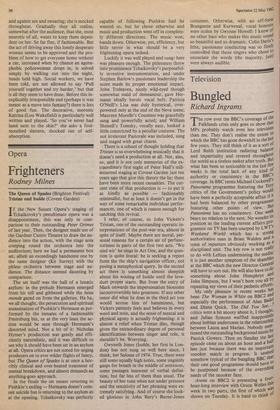Opera
Frighteners
Rodney MIlnes
If the New Sussex Opera's staging of Tchaikovsky's penultimate opera was a disappointment, this was only in com- parison to their outstanding Peter Grimes of last year. Then, the designer made use of the Gardner Centre Theatre to draw the au- dience into the action, with the stage area creeping round the orchestra into the auditorium; here we had a permanent box set, albeit an exceedingly handsome one by the same designer (Kit Surrey) with the pitless orchestra between stage and au- dience. The distance seemed daunting by comparison.
The set itself was the hail of a lunatic asylum: in the prelude Hermann emerged from his cell and gibbered while the beau monde gazed on from the galleries. Ha ha, we all thought, the persecution and spiritual assassination of Pushkin's Hermann as per- formed by the inmates of a fashionable Petersburg bin, or at the very least the ac- tion would be seen through Hermann's distorted mind. Not a bit of it: Nicholas Hytner's production was gently and effi- ciently naturalistic, and it was difficult to see why it should have been set in an asylum at all. Opera critics are not noted for urging producers on to ever wilder flights of fancy, but The Queen of Spades is at once a hor- ribly clinical and over-heated treatment of mental breakdown, and almost demands an anything-goes approach. In the finale the set meant reverting to Pushkin's ending — Hermann doesn't com- mit suicide but is returning to the asylum as at the opening. Tchaikovsky was perfectly
capable of following Pushkin had he wanted to, but he chose otherwise and music and production went off in complete- ly different directions. The music won, hands down. Otherwise, yes, efficiency, but little terror in what should be a very frightening opera indeed.
Luckily it was well played and sung: here was pleasure enough. The pitlessness threw into prominence Tchaikovsky's purposeful- ly inventive instrumentation, and under Stephen Barlow's passionate leadership the score made its proper emotional impact. John Treleaven, nicely wild-eyed though somewhat staid of demeanour, gave Her- mann ideally heroic vocal heft; Patricia O'Neill's Lisa was duly hysterical, over- powered only at the end of the Neva scene; Maureen Morelle's Countess was gracefully sung and powerfully acted; and William Shimell's Tomsky, vocally easy, looked a little constricted by a peculiar costume. The not irrelevant Pastorale was included, sung and staged with great charm.
There is a school of thought holding that Tristan is so overwhelming musically that it doesn't need a production at all. Not, alas, so, and it is not only memories of the ex- traordinary first night of Peter Hall's still- mourned staging at Covent Garden just ten years ago that give this theory the lie; there have been more recent casualties. The cur- rent state of that production is — to put it as kindly as possible — fashionably minimalist, but at least it doesn't get in the way of some remarkable individual perfor- mances, one of which is reason enough for catching this revival.
I refer, of course, to John Vickers's Tristan, one of the outstanding operatic in- terpretations of the post-war era, almost in spite of itself. Maybe there are moral, per- sonal reasons for a certain air of perfunc- toriness in parts of the first two acts. `Wo sind wir' he sings in Act One, and the ques- tion is quite literal: he is seeking a report from the the ship's navigation officer, not posing a metaphysical query. In the second act there is something almost sheepish about his wooing of Isolde until the love- duet proper starts. But from the entry of Mark onwards the impersonation blossoms incontrovertibly into greatness. If any other tenor did what he does in the third act you would accuse him of hamminess, but Vickers patently feels and believes in every word and note, and the sense of mental and physical agony is actually frightening: it is almost a relief when Tristan dies, though given the extraordinary degree of personal identification between singer and role, it shouldn't be. Worrying.
Gwyneth Jones (Isolde, her first in Lon- don) has not sung so well here since, I think, her Salome of 1974. True, there were still some squally high notes, some ungainly gasps for breath in the middle of sentences, some passages innocent of verbal defini- tion, but far less of them than usual. The beauty of her tone when not under pressure and the sensitivity of her phrasing were ex- tremely satisfying. And of course she look- ed glorious in John Bury's Burne-Jones costumes. Otherwise, with an off-form Brangaene and Kurwenal, vocal honours were stolen by Gwynne Howell: I know of no other bass who makes this music sound so beautiful and so dramatic. Colin Davis '5 lithe, passionate conducting was so finely controlled that those singers who chose to enunciate the words (the majority, just) were always audible.






































 Previous page
Previous page